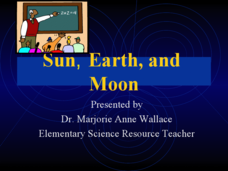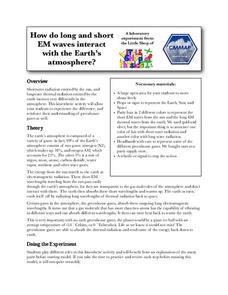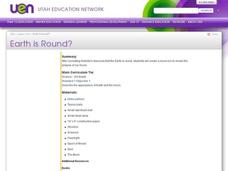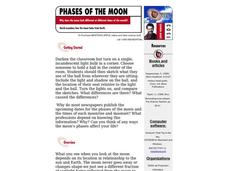California Academy of Science
Kinesthetic Astronomy: Earth's Rotation
After completing the activity, "Kinesthetic Astronomy: The Meaning of a Year," zoom in on Earth's rotation using the same simulation setup and this outline. Each class member dons a map of the Western Hemisphere and plays the part of...
Curated OER
The Sun, Moon, and Our Solar System: Teacher/Student Notes
Introduce basic Earth and space science to your budding astronauts. This handout works in two ways, the first part provides information about the sun, moon, eclipses, and Earth to be read to or by the class. The second part is composed...
Scholastic
Lesson One: The Earth, Background and Glossary
How much do you really know about our planet? Middle schoolers build up their prior knowledge about Earth, its placement in the solar system, its composition, and important geological vocabulary with an introductory earth science lesson.
Curated OER
Earth Science
A slide for each of the planets (including recently downgraded Pluto), the sun, our moon, four of Jupiter's moons, and the rings of Saturn make up this visually appealing PowerPoint. A few facts for each body in the solar system...
Curated OER
Fact and Opinion
Facts and opinions are clearly defined in this organized PowerPoint. Following the definitions are a few examples that students must identify as facts or opinions. Tip: After viewing this presentation, ask students to share some of their...
Curated OER
Sun, Earth, and Moon
Cute graphics make this an attractive presentation for upper elementary classrooms, and multiple choice questions make it interactive as well. There is, however, a lack of coherence. For example, slide #4 addresses the air we breathe,...
Curated OER
The Sun, Moon, and Stars
First graders will learn about the Earth's place in our solar system and its relationship to the sun, moon, and stars in this vibrant PowerPoint. The ten slides are full of great photographs to give students the full effect of each...
Colorado State University
How Do Long and Short EM Waves Interact with the Earth's Atmosphere?
Things are about to heat up in your classroom! A kinesthetic lesson asks learners to play the part of the gases in the earth's atmosphere and interact with the sun's radiation. The focus is to learn the impact of the increasing...
Scholastic
Lesson Three: The Earth, Movement in Space
If you feel like you're standing still, you're wrong! The Earth is constantly rotating and orbiting under our feet. Demonstrate the Earth's movement within the solar system with a collaborative activity. With a candle or lamp in the...
MENSA Education & Research Foundation
The Moon: Earth’s Dependable Neighbor
Scholars become experts on the moon, its phases, and craters with a series of lessons, activities, and extension opportunities. Learners' expert level of knowledge includes moon facts, how moon craters are created, the ability to...
Mr. Hill's Science Website
Solar System Fact Sheet
Here is a fantastic, educational handout packed with information and facts not only about the planets in our solar system, but also regarding major moons and their surface features, dwarf planets, comets, and asteroids.
Super Teacher Worksheets
Our Solar System Scavenger Hunt Activity
Send students on a search for facts about the solar system with this scavenger hunt activity. Whether they are finding out how far the sun is from the earth, or the names of all four gas giants, this resource will engage young...
Curated OER
Earth is Round?
Third graders discuss how Aristotle concluded that the Earth was round. As a class, they review theories about the Earth's shape and describe how life on Earth would be different if it were flat. Individually, they make a moon book in...
Curated OER
Origins: Earth Is Born
Students develop a timeline of all the major events involved in the formation of the Earth and the emergence of humans. In groups, they focus on a specific topic by watching a PBS program and taking notes. After the video, they list...
Curated OER
How Does the Sun Seem To Move?
In this sun worksheet, students will fill in the blank of 3 statements about observing the movement of the sun. Then students will fill in the blank of a conclusion they develop from the facts. This worksheet is a graphic organizer.
Curated OER
Phases of the Moon
Students explore why when you examine the moon depends on its location in relationship to the sun and Earth. The moon never goes away or changes shape-we just see a different fraction of sunlight being reflected from the moon to Earth.
Curated OER
Day and Night
Inform your elementary scientists why we experience day and night. They are provided with facts and explanation as to why the day and night cycle occur, discuss what they've learned with a partner, and are then given the task of writing...
Curated OER
SCHOOLYARD SUNDIAL
Students study the apparent motion of the Sun in the sky over the course of a day and a year, and analyze what causes seasons on Earth. They participate in a project that has both a science as well as an art component.
Space Awareness
Measure the Solar Diameter
Scientists could measure the diameter of the sun before they knew its distance. Scholars construct a simple mirror box to measure the diameter for themselves. They compare this measurement with the official size, listed in a...
Space Awareness
The Sun Compass of the Vikings
Evidence shows the Vikings likely navigated by using a simple sundial to find their course. Videos, a short story, and discussion help bring this time period to life as they study European history with a hands-on experiment. Scholars...
Curated OER
Fast Fact-Finding
Ever wonder why the sky changes color so often? Readers examine an informational excerpt from John Farndon's How the Earth Works. They underline key points as they read and then answer five response questions. Prompts review main...
Curated OER
The Earth's Rotation
Students see a model of a globe to watch the Earth rotate. In this Earth lesson, students rotate the globe and shine a flashlight to see where the sun shines and how it rises and sets. They create a diagram and explain day and night in...
Curated OER
The Earth is Flat
Third graders experiment to gain understanding of the shape and rotation of the Earth. In this Sun and Moon science lesson, 3rd graders understand that the Earth rotates on its axis and how that explains the appearance of the moon and sun.
Curated OER
Microbial Influence on Earth's Systems
Students identify the different biogeochemical cycles on Earth. In this biology lesson, students observe microbes under a microscope. They compare and contrast respiration and photosynthesis.





